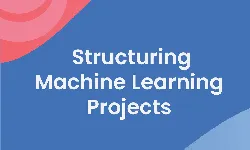
Structuring Machine Learning Projects 
This course provides an overview of the essential components of a successful machine learning project, from framing the problem to deploying a solution. Students will gain the skills to structure ML projects and develop strategies to ensure success. ▼
ADVERTISEMENT
Course Feature
![]() Cost:
Cost:
Free
![]() Provider:
Provider:
Coursera
![]() Certificate:
Certificate:
No Information
![]() Language:
Language:
English
![]() Start Date:
Start Date:
Self Paced
Course Overview
❗The content presented here is sourced directly from Coursera platform. For comprehensive course details, including enrollment information, simply click on the 'Go to class' link on our website.
Updated in [March 06th, 2023]
This course provides an overview of Structuring Machine Learning Projects. It covers topics such as Machine Learning, Deep Learning, Inductive Transfer, and Multi-Task Learning. Participants will gain an understanding of the fundamentals of Machine Learning and Deep Learning, as well as the principles of Inductive Transfer and Multi-Task Learning. They will also learn how to structure Machine Learning projects and apply the techniques to real-world problems. By the end of the course, participants will have a better understanding of the various techniques and be able to apply them to their own projects.
[Applications]
After completing this course, students should be able to apply the concepts learned to their own machine learning projects. They should be able to structure their projects in a way that maximizes the chances of success, and be able to identify and address potential problems. Additionally, they should be able to identify when inductive transfer and multi-task learning can be used to improve the performance of their models. Finally, they should be able to identify when deep learning can be used to improve the performance of their models.
[Career Paths]
1. Machine Learning Engineer: Machine Learning Engineers are responsible for developing and deploying machine learning models. They are responsible for designing, building, and maintaining machine learning systems, as well as for researching and developing new algorithms and techniques. They must have a strong understanding of mathematics, statistics, and computer science, as well as a deep knowledge of machine learning algorithms and techniques. The development of machine learning models is a rapidly growing field, and Machine Learning Engineers are in high demand.
2. Deep Learning Engineer: Deep Learning Engineers are responsible for developing and deploying deep learning models. They must have a strong understanding of mathematics, statistics, and computer science, as well as a deep knowledge of deep learning algorithms and techniques. Deep Learning Engineers are in high demand, as the development of deep learning models is a rapidly growing field.
3. Inductive Transfer Engineer: Inductive Transfer Engineers are responsible for developing and deploying inductive transfer models. They must have a strong understanding of mathematics, statistics, and computer science, as well as a deep knowledge of inductive transfer algorithms and techniques. Inductive Transfer Engineers are in high demand, as the development of inductive transfer models is a rapidly growing field.
4. Multi-Task Learning Engineer: Multi-Task Learning Engineers are responsible for developing and deploying multi-task learning models. They must have a strong understanding of mathematics, statistics, and computer science, as well as a deep knowledge of multi-task learning algorithms and techniques. Multi-Task Learning Engineers are in high demand, as the development of multi-task learning models is a rapidly growing field.
[Education Paths]
1. Bachelor's Degree in Computer Science: A Bachelor's Degree in Computer Science is a great way to gain a comprehensive understanding of the fundamentals of computer science and its applications. This degree will provide students with the knowledge and skills necessary to develop and implement computer programs, analyze data, and design algorithms. Additionally, students will learn about the latest trends in machine learning, deep learning, inductive transfer, and multi-task learning.
2. Master's Degree in Artificial Intelligence: A Master's Degree in Artificial Intelligence is a great way to gain a deeper understanding of the principles and techniques of artificial intelligence. This degree will provide students with the knowledge and skills necessary to develop and implement AI-based systems, analyze data, and design algorithms. Additionally, students will learn about the latest trends in machine learning, deep learning, inductive transfer, and multi-task learning.
3. Doctoral Degree in Machine Learning: A Doctoral Degree in Machine Learning is a great way to gain a comprehensive understanding of the principles and techniques of machine learning. This degree will provide students with the knowledge and skills necessary to develop and implement machine learning algorithms, analyze data, and design systems. Additionally, students will learn about the latest trends in machine learning, deep learning, inductive transfer, and multi-task learning.
4. Certificate in Data Science: A Certificate in Data Science is a great way to gain a comprehensive understanding of the principles and techniques of data science. This certificate will provide students with the knowledge and skills necessary to analyze data, develop and implement data-driven systems, and design algorithms. Additionally, students will learn about the latest trends in machine learning, deep learning, inductive transfer, and multi-task learning.
Pros & Cons

High level view on how to direct ML projects.

Valuable and updated material.

Step by step procedure to approach and solve a problem.

Real world problems provided.

Useful advice from a machine learning master.

Repeated material from previous courses.

Limited challenging material.

No programming.

Too elementary and abstract.

Not enough hands on coding experience.
Course Provider

Provider Coursera's Stats at AZClass
Discussion and Reviews
0.0 (Based on 0 reviews)
Explore Similar Online Courses

Agile Innovation and Problem Solving Skills

Free Social Psychology Tutorial - Learn Criminal Psychology Fundamentals

Python for Informatics: Exploring Information

Social Network Analysis

Introduction to Systematic Review and Meta-Analysis

The Analytics Edge

DCO042 - Python For Informatics

Causal Diagrams: Draw Your Assumptions Before Your Conclusions

Whole genome sequencing of bacterial genomes - tools and applications

How I would learn Machine Learning (if I could start over)

Learn Data Science and Machine Learning on Microsoft Azure

Machine Learning for Everyone
 Related Categories
Related Categories
 Popular Providers
Popular Providers
Quiz
 Submitted Sucessfully
Submitted Sucessfully
1. What is the main focus of the course?
2. What is the most important factor when structuring a machine learning project?
3. What is the most important step when structuring a machine learning project?


Start your review of Structuring Machine Learning Projects